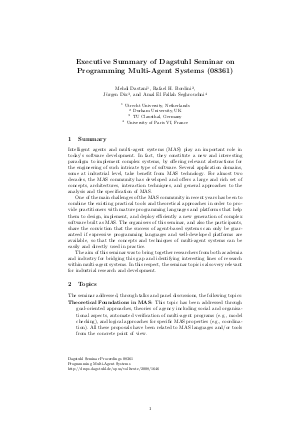08361 Executive Summary – Programming Multi-Agent Systems
Authors Rafael Bordini, Mehdi Dastani, Jürgen Dix, Amal El Fallah-Seghrouchni
-
Part of:
Volume:
Dagstuhl Seminar Proceedings, Volume 8361
Part of: Series: Dagstuhl Seminar Proceedings (DagSemProc) - License:
 Creative Commons Attribution 4.0 International license
Creative Commons Attribution 4.0 International license
- Publication Date: 2008-11-04
File

PDF
DagSemProc.08361.2.pdf
- Filesize: 107 kB
- 4 pages
Document Identifiers
Subject Classification
Keywords
- Multi-agent systems programming
Metrics
- Access Statistics
-
Total Accesses (updated on a weekly basis)
0Document
0Metadata
Abstract
Intelligent agents and multi-agent systems (MAS) play an important role in today’s software development. In fact, they constitute a new and interesting paradigm to implement complex systems, by offering relevant abstractions for the engineering of such intricate type of software. Several application domains, some at industrial level, take benefit from MAS technology. For almost two decades, the MAS community has developed and offers a large and rich set of concepts, architectures, interaction techniques, and general approaches to the analysis and the specification of MAS.
Cite As Get BibTex
Rafael Bordini, Mehdi Dastani, Jürgen Dix, and Amal El Fallah-Seghrouchni. 08361 Executive Summary – Programming Multi-Agent Systems. In Programming Multi-Agent Systems. Dagstuhl Seminar Proceedings, Volume 8361, pp. 1-4, Schloss Dagstuhl – Leibniz-Zentrum für Informatik (2008)
https://doi.org/10.4230/DagSemProc.08361.2
BibTex
@InProceedings{bordini_et_al:DagSemProc.08361.2,
author = {Bordini, Rafael and Dastani, Mehdi and Dix, J\"{u}rgen and El Fallah-Seghrouchni, Amal},
title = {{08361 Executive Summary – Programming Multi-Agent Systems}},
booktitle = {Programming Multi-Agent Systems},
pages = {1--4},
series = {Dagstuhl Seminar Proceedings (DagSemProc)},
ISSN = {1862-4405},
year = {2008},
volume = {8361},
editor = {Rafael Bordini and Mehdi Dastani and J\"{u}rgen Dix and Amal El Fallah-Seghrouchni},
publisher = {Schloss Dagstuhl -- Leibniz-Zentrum f{\"u}r Informatik},
address = {Dagstuhl, Germany},
URL = {https://drops.dagstuhl.de/entities/document/10.4230/DagSemProc.08361.2},
URN = {urn:nbn:de:0030-drops-16463},
doi = {10.4230/DagSemProc.08361.2},
annote = {Keywords: Multi-agent systems programming}
}
